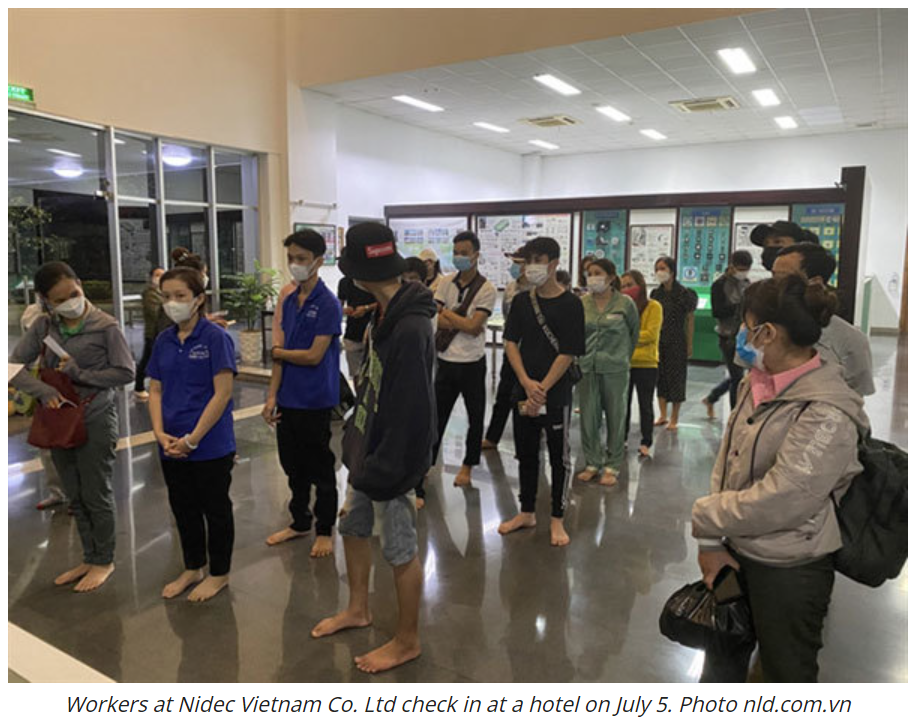Vietnam: Businesses adapt to the pandemic, offer workers temporary housing
Many businesses and manufacturers are finding ways to adapt to the COVID-19 pandemic, maintaining operations and keeping workers safe.
In the first six months of the year, about 70,200 businesses were closed due to the pandemic, a year-on-year increase of 24.9 per cent, according to the General Statistics Office.
Businesses in industrial parks and export processing zones in HCM City have prepared plans to set up temporary accommodations for their workers as part of an effort to reduce the risk of infections that could result in the closure of factories.
As many as 40 businesses in industrial parks and export processing zones have registered to offer accommodations for workers at their premises to avoid the spread of the virus, according to the HCM City Industrial Park and Export Processing Zone Authority (HEPZA).
Workers have been asked to work overtime to prevent reduction in output as it is difficult to recruit new employees amid the outbreak. Management of product quality systems has been strengthened to reduce substandard products.
Vissan joint-stock company has used its warehouse as temporary accomodations for workers. Nguyen Ngoc An, general director of Vissan, said that providing temporary housing for workers was considered as a last resort to gain the dual goals of fighting the pandemic and maintaining production.
Transportation of workers, especially on buses, and the staff represents a huge threat as potential transmitters of the virus.
Workers and staff have been encouraged to stay at the factory around the clock, with costs of accommodations and meals covered by the company.
Hotel quarantine for workers
Many businesses in the Sai Gon High-Tech Park in Thu Duc City have rented hotel rooms for their workers to self-quarantine after work in response to a lockdown order in Thu Duc City’s Tan Phu District that started on Tuesday.
Luu Kim Hong, chairman of the Trade Union at Nidec Vietnam Co. Ltd, said the company had encouraged its workers to maintain work to meet production. The company employs some 6,000 labourers, including 2,000 workers living in Tan Phu District, which is now under lockdown.
More than 100 workers who live in Tan Phu District have agreed to stay at a hotel and the remaining 1,900 workers have returned home.
Workers receive three meals and do overtime work when they stay near the company.
The company is struggling to maintain operation with the lockdown of Tan Phu District, but is now trying to find other ways of maintaining production, Hong said.
Labourers enjoy 70 per cent of their wages if they are put under quarantine, she added.
The deputy head of the Sai Gon High-Tech Park management board, Le Bich Loan, said many companies managed to rent hotel rooms for workers living in Tan Phu District following the social distancing requirements.
The management board has asked companies in the industrial park to try to find temporary accommodations for workers.
Six companies registered to offer worker housing but they are still waiting to get approval from the health authorities.
Changing investment strategies
The GC Food joint-stock company changed its operations in response to the pandemic, with a sharp cut in marketing and promotion events.
Nguyen Van Thu, general director of the company, said it was now focusing on long-term investment to increase production output in the future.
The company is shifting its investment in raising the number of cows to 1,000 from around 100 to prepare for a market rebound.
As consumers hold back on spending due to the economic impact of the pandemic, marketing and promotion costs offer little benefit in sales, he said.
Source: Vietnam News


 Thailand
Thailand




